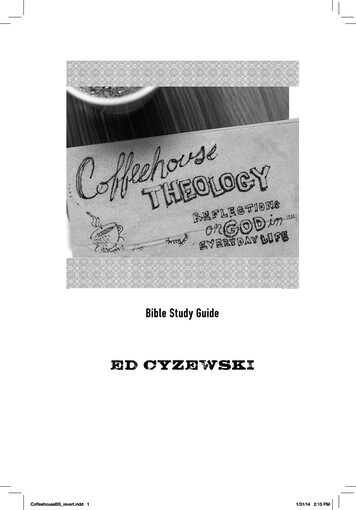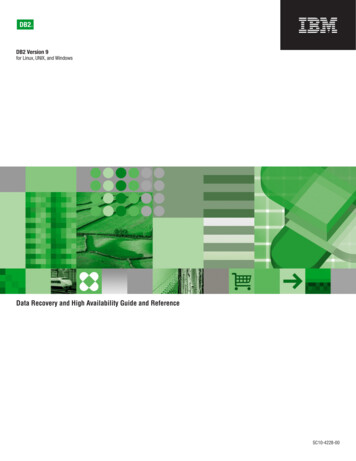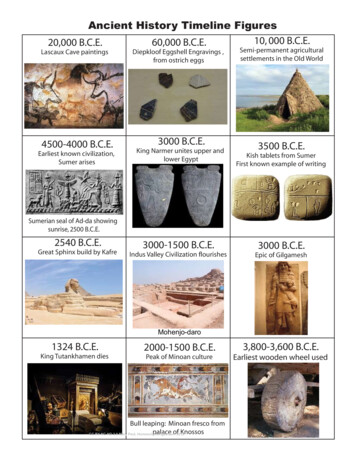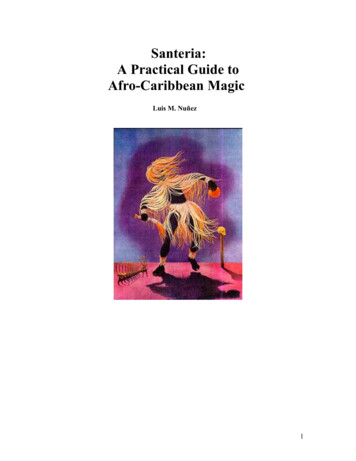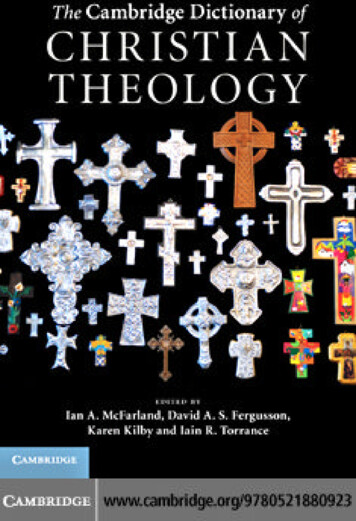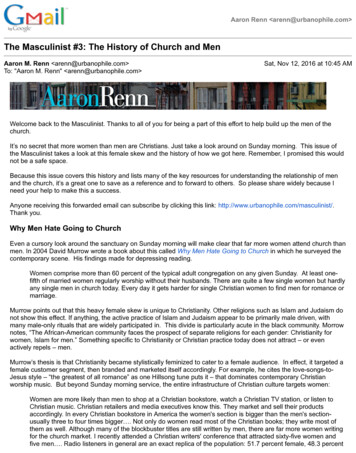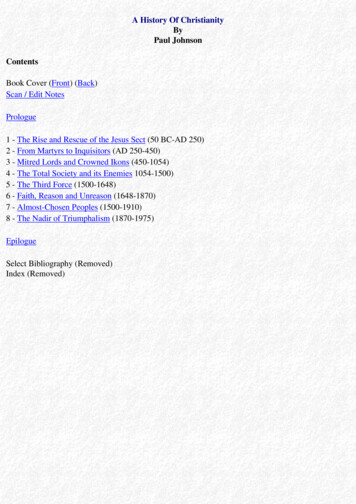
Transcription
A History Of ChristianityByPaul JohnsonContentsBook Cover (Front) (Back)Scan / Edit NotesPrologue1 - The Rise and Rescue of the Jesus Sect (50 BC-AD 250)2 - From Martyrs to Inquisitors (AD 250-450)3 - Mitred Lords and Crowned Ikons (450-1054)4 - The Total Society and its Enemies 1054-1500)5 - The Third Force (1500-1648)6 - Faith, Reason and Unreason (1648-1870)7 - Almost-Chosen Peoples (1500-1910)8 - The Nadir of Triumphalism (1870-1975)EpilogueSelect Bibliography (Removed)Index (Removed)
Scan / Edit NotesVersions available and duly posted:Format: v1.0 (Text)Format: v1.0 (PDB - open format)Format: v1.5 (HTML)Format: v1.5 (PDF - no security)Genera: History (Religion-Christian)Extra's: Pictures IncludedCopyright: 1976 / 1985 (This Edition)Scanned: August-3-2003Posted to:alt.binaries.e-book (PDF) and (HTML-PIC-TEXT-PDB Bundle)alt.binaries.e-book.palm (PDB-PIC-TXT Bundle) and (UBook)Note:1. The Html, Text and Pdb versions are bundled together in one rar file. (a.b.e)2. The Pdf file is sent as a single rar (a.b.e)3. The Text and Pdb versions are bundled together in one rar file. (a.b.e.p)4. The Ubook version is in zip (html) format (instead of rar). (a.b.e.p) Structure: (Folder and Sub Folders){Main Folder} - HTML Files - {Nav} - Navigation Files - {PDB} - {Pic} - Graphic files - {Text} - Text File-Salmun
PrologueIt is now almost 2000 years since the birth of Jesus Christ set in motion the chain of events which ledto the creation of the Christian faith and its diffusion throughout the world. During these twomillennia Christianity has, perhaps, proved more influential in shaping human destiny than any otherinstitutional philosophy, but there are now signs that its period of predominance is drawing to a close,thereby inviting a retrospect and a balance sheet. In this book I have attempted to survey the wholehistory in one volume. This involves much compression and selection, but it has the advantage ofproviding new and illuminating perspectives, and of demonstrating how the varied themes ofChristianity repeat and modulate themselves through the centuries. It draws on the published results ofa vast amount of research which has been conducted during the past twenty years on a number ofnotable episodes in Christian history, and it aims to present the salient facts as modern scholars seeand interpret them.It is, then, a work of history. You may ask: is it possible to write of Christianity with the requisitedegree of historical detachment? In 1913 Ernst Troeltsch argued persuasively that sceptical andcritical methods of historical research were incompatible with Christian belief; many historians andmost religious sociologists would agree with him. There is, to be sure, an apparent conflict.Christianity is essentially a historical religion. It bases its claims on the historical facts it asserts. Ifthese are demolished it is nothing. Can a Christian, then, examine the truth of these facts with thesame objectivity he would display towards any other phenomenon? Can he be expected to dig thegrave of his own faith if that is the way his investigations seem to point? In the past, very fewChristian scholars have had the courage or the confidence to place the unhampered pursuit of truthbefore any other consideration. Almost all have drawn the line somewhere. Yet how futile theirdefensive efforts have proved! How ridiculous their sacrifice of integrity seems in retrospect! Welaugh at John Henry Newman because, to protect his students, he kept his copy of The Age of Reasonlocked up in his safe. And we feel uncomfortable when Bishop Stubbs, once Regius Professor ofModern History at Oxford, triumphantly records - as he did in a public lecture - his first meeting withthe historian John Richard Green: 'I knew by description the sort of man I was to meet: I recognisedhim as he got into the Wells carriage, holding in his hand a volume of Renan. I said to myself, "If Ican hinder, he shall not read that book." We sat opposite and fell immediately into conversation. . Hecame to me at Navestock afterwards, and that volume of Renan found its way into my waste-paperbasket.' Stubbs had condemned Renan's Vie de Jesus without reading it, and the whole point of hisanecdote was that he had persuaded Green to do the same. So one historian corrupted another, andChristianity was shamed in both.For Christianity, by identifying truth with faith, must teach - and, properly understood, does teach that any interference with the truth is immoral. A Christian with faith has nothing to fear from thefacts; a Christian historian who draws the line limiting the field of enquiry at any point whatsoever, isadmitting the limits of his faith. And of course he is also destroying the nature of his religion, which isa progressive revelation of truth. So the Christian, according to my understanding, should not beinhibited in the smallest degree from following the line of truth; indeed, he is positively bound tofollow it. He should be, in fact, freer than the non-Christian, who is precommitted by his ownrejection. At all events, I have sought to present the facts of Christian history as truthfully and nakedlyas I am able, and to leave the rest to the reader.
Iver, Buckinghamshire 1975
1 - The Rise and Rescue of the Jesus Sect (50 BC-AD 250)Some time about the middle of the first century AD, and very likely in the year 49, Paul of Tarsustravelled south from Antioch to Jerusalem and there met the surviving followers of Jesus of Nazareth,who had been crucified about sixteen years before. This Apostolic Conference, or Council ofJerusalem, is the first political act in the history of Christianity and the starting-point from which wecan seek to reconstruct the nature of Jesus's teaching and the origins of the religion and church hebrought into being.We have two near-contemporary accounts of this Council. One, dating from the next decade, wasdictated by Paul himself in his letter to the Christian congregations of Galatia in Asia Minor. Thesecond is later and comes from a number of sources or eye-witness accounts assembled in Luke's Actsof the Apostles. It is a bland, quasi-official report of a dispute in the Church and its satisfactoryresolution. Let us take this second version first. It relates that 'fierce dissension and controversy' hadarisen in Antioch because 'certain persons', from Jerusalem and Judea, in flat contradiction to theteaching of Paul, had been telling converts to Christianity that they could not be saved unless theyunderwent the Jewish ritual of circumcision. As a result, Paul, his colleague Barnabas, and othersfrom the mission to the gentiles in Antioch, travelled to Jerusalem to consult with 'the apostles andelders'.There they had a mixed reception. They were welcomed by 'the church and the apostles and theelders'; but 'some of the Pharisaic party who had become believers' insisted that Paul was wrong andthat all converts must not only be circumcized but taught to keep the Jewish law of Moses. There was'a long debate', followed by speeches by Peter, who supported Paul, by Paul himself and Barnabas,and a summing up by James, the younger brother of Jesus. He put forward a compromise which wasapparently adopted 'with the agreement of the whole Church'. Under this, Paul and his colleagues wereto be sent back to Antioch accompanied by a Jerusalem delegation bearing a letter. The letter set outthe terms of the compromise: converts need not submit to circumcision but they must observe certainprecepts in the Jewish law in matters of diet and sexual conduct. Luke's record in Acts states that thishalf-way position was arrived at 'unanimously', and that when the decision was conveyed to theAntioch congregation, 'all rejoiced'. The Jerusalem delegates were thus able to return to Jerusalem,having solved the problem, and Paul carried on with his mission.This, then, is the account of the first council of the Church as presented by a consensus document,what one might call an eirenic and ecumenical version, designed to present the new religion as amystical body with a co-ordinated and unified life of its own, moving to inevitable and predestinedconclusions. Acts, indeed, says specifically that the ruling of the Council was 'the decision of the HolySpirit'. No wonder it was accepted unanimously! No wonder that 'all' in Antioch 'rejoiced at theencouragement it brought'.Paul's version, however, presents quite a different picture. And his is not merely an eye-witnessaccount, but an account by the chief and central participant, perhaps the only one who grasped themagnitude of the issues at stake. Paul is not interested in smoothing the ragged edges of controversy.He is presenting a case to men and women whose spiritual lives are dominated by the issuesconfronting the elders in that room in Jerusalem. His purpose is not eirenic or ecumenical, still less
diplomatic. He is a man burning to tell the truth and to imprint it like fire in the minds of his readers.In the apocryphal Acts of Paul, written perhaps a hundred years after his death, the tradition of hisphysical appearance is vividly preserved: ' . a little man with a big, bold head. His legs were crooked,but his bearing was noble. His eyebrows grew close together and he had a big nose. A man whobreathed friendliness.' He himself says that his appearance was unimpressive. He was, he admits, noorator; not, in externals, a charismatic leader. But the authentic letters which survive him radiate theinner charisma: they have the ineffaceable imprint of a massive personality, eager, adventurous,tireless, voluble, a man who struggles heroically for the truth and then delivers it in uncontrollableexcitement, hurrying ahead of his powers of articulation. Not a man easy to work with, or confute inargument, or rebuke into silence, or to advance a compromise: a dangerous, angular, unforgettableman, breathing friendliness, indeed, but creating monstrous difficulties and declining to resolve themby any sacrifice of the truth.Moreover, Paul was quite sure he had got the truth. He has no reference to the Holy Spirit endorsing,or even advancing, the compromise solution as presented by Luke. In his Galatians letter, a fewsentences before his version of the Jerusalem Council, he dismisses, as it were, any idea of a conciliarsystem directing the affairs of the Church, any appeal to the judgment of mortal men sitting in council.'I must make it clear to you, my friends,' he writes, 'that the gospel you heard me preach is no humaninvention. I did not take it over from any man; no man taught it me; I received it through a revelationof Jesus Christ.' Hence, when he comes to describe the council and its consequences he writes exactlyas he feels, in harsh, concrete and unambiguous terms. His Council is not a gathering of inspiredpneumatics, operating in accordance with infallible guidance from the spirit, but a human conferenceof weak and vulnerable men, of whom he alone had a divine mandate.How, as Paul saw it, could it be otherwise? Jewish elements were wrecking his mission in Antioch,which he was conducting on the express instructions of God, 'who had set me apart from birth andcalled me through his grace, chose to reveal his Son to me and through me, in order that I mightproclaim him among the gentiles'. To defeat them, therefore, he went to Jerusalem 'because it hadbeen revealed by God that I should do so'. He saw the leaders of the Jerusalem Christians, 'the men ofrepute', as he terms them, 'at a private interview'. These men, James, Christ's brother, the ApostlesPeter and John, 'those reputed pillars of our society', were inclined to accept the gospel as Paul taughtit and to acknowledge his credentials as an apostle and teacher of Christ's doctrine. They divided upthe missionary territory, 'agreeing that we should go to the gentiles while they went to the Jews'. Allthey asked was that Paul should ensure that his gentile congregations should provide financial supportfor the Jerusalem Church, 'which was the very thing I made it my business to do.' Having reached thisbargain, Paul and the pillars 'shook hands on it'. There is no mention that Paul made concessions ondoctrine. On the contrary, he complains that enforcing circumcision on converts had hitherto been'urged' as a sop to 'certain sham-Christians, interlopers who had stolen in to spy upon the liberty weenjoy in the fellowship of Jesus Christ'. But 'not for a moment did I yield to their dictation.' He was'determined on the full truth of the gospel'. Unfortunately, continues Paul, his apparent victory atJerusalem did not end the matter. The 'pillars', who had contracted to stand firm against the Jewish'sham-Christians', in return for financial support, did not do so.When Peter later came to Antioch, he was prepared at first to treat gentile Christians as religious andracial equals and eat his meals with them; but then, when emissaries from James arrived in the city, he'drew back and began to hold aloof, because he was afraid of the advocates of circumcision'. Peter was
'clearly in the wrong'. Paul told him so 'to his face'. Alas, others showed the 'same lack of principle',even Barnabas, who 'played false like the rest'. Paul writes in a context in which the battle, far frombeing won, is continuing and becoming more intense; and he gives the distinct impression that hefears it could be lost.Paul writes with passion, urgency and fear. He disagrees with the account in Acts not merely becausehe sees the facts differently but because he has an altogether more radical idea of their importance. ForLuke, the Jerusalem Council is an ecclesiastical incident. For Paul, it is part of the greatest struggleever waged. What lies behind it are two unresolved questions. Had Jesus Christ founded a newreligion, the true one at last? Or, to put it another way, was he God or man? If Paul is vindicated,Christianity is born. If he is overruled, the teachings of Jesus become nothing more than the hallmarksof a Jewish sect, doomed to be submerged in the mainstream of an ancient creed.To demonstrate why Paul's analysis was substantially correct, and the dispute the first great turningpoint in the history of Christianity, we must first examine the relationship between Judaism and theworld of the first century AD. By the time of Christ, the Roman republic, which had been doubling insize with every generation, had expanded to encompass the whole of the Mediterranean theatre. It wasin some respects a liberal empire, bearing the marks of its origins. This was a new, indeed unique,conjunction in world history: an empire which imposed stability and so made possible freedom oftrade and communications throughout a vast area, yet did not seek to regiment ideas or inhibit theirexchange and propagation. The Roman law could be brutal and was always relentless, but it stilloperated over a comparatively limited area of human conduct. Many fields of economic and culturalactivity lay outside its scope. Moreover, even where the law prescribed, it was not always assiduous.Roman law tended to sleep unless infractions were brought to its attention by the external signs ofdisorder: vociferous complaints, breaches of the peace, riots. Then it warned, and if its warnings wentunheeded, acted with ferocity until silence was reimposed; afterwards, it would sleep again. WithinRoman rule, a sensible and circumspect man, however antinomian his views, could survive andflourish, and even propagate them; it was one very important reason why Rome was able to extendand perpetuate itself.In particular, Rome was tolerant towards the two great philosophical and religious cultures whichconfronted it in the central and eastern Mediterranean: Hellenism and Judaism. Rome's ownrepublican religion was ancient but primitive and jejune. It was a religion of State, concerned withcivil virtues and outward observance. It was administered by paid government functionaries and itspurposes and style were indistinguishable from those of the State. It did not touch the heart or imposeburdens on a man's credulity. Cicero and other intellectuals defended it on no higher grounds than thatit was an aid to public decorum. Of course, being a state religion, it modified itself as the forms ofgovernment changed. When the republic failed, the new emperor became, ex officio, the PontifexMaximus. Imperialism was an eastern idea; and it carried with it the notion of quasi-divine powersinvested in the ruler. Accordingly, after the death of Caesar, the Roman senate usually voted thedeification of an emperor, provided he had been successful and admired; a witness would swear hehad seen the dead man's soul wing to heaven from the funeral pyre. But the system which linkeddivinity to government was observed more in the letter than the spirit; sometimes not even in theletter. Emperors who claimed divinity in their lifetimes - Caligula, Nero, Domitian -were not sohonoured once they were safely dead; and the compulsory veneration of a living emperor was morelikely to be enforced in the provinces than in Rome. Even in the provinces the public sacrifices were
simply a routine genuflection to government; on the vast majority of Rome's citizens and subjects theyimposed no burden of conscience.The State's compulsory but marginal civic creed thus left ample freedom for the psyche within theempire. Every man could have and practise a second religion if he chose. Or, to put it another way, themandatory civic cult made possible freedom of worship. The choice was enormous. There were somecults of specific Roman origin and taste. Then, all the subject peoples who had been absorbed into theempire had their own gods and goddesses; they often won adherents because they were not identifiedwith the State and their native ceremonies and priests had exotic glamour. The religious scene wasconstantly shifting. All, and especially the well-to-do, were encouraged to participate in it by the verynature of the educational system, which was identified with no cult but was in a sense the domicile ofall. The empirical quest for religious truth was inseparable from any other form of knowledge.Theology was part of philosophy, or vice versa', and rhetoric, the art of proof and disproof, was thehandmaiden of both. The common language of the empire was Greek and it was especially the tongueof business, education, and truth-seeking. And Greek, as a language and as a culture, was transformingthe Roman world-view of religious experience.Greek religion, like Roman, had been in origin a series of city-cults, public demonstrations of fear,respect and gratitude towards the home-gods of the city-state. Alexander's creation of a Hellenicempire had transformed the city-states into a vast territorial unit, in which the free citizen was nolonger, as a rule, directly involved in government. He thus had time, opportunity, and above all motiveto develop his private sphere and explore his own individual and personal responsibilities. Philosophybegan to direct itself increasingly to intimate conduct. Thus, under the impulse of the Greek genius, anage of personal religion opened. What had hitherto been purely a matter of tribal, racial, city, state or in the loosest sense - social conformity now became a matter of individual concern. Who am I? Wheream I going? What do I believe? What, then, must I do? These questions were being askedincreasingly, and not only by Greeks. The Romans were undergoing a similar process of emancipationfrom all-demanding civic duty. Indeed, one could say that the world-empire itself freed multitudesfrom the burdens of public concern and gave them leisure to study their navels. In the schools, thestress was increasingly on moral teaching, chiefly Stoic in origin. Lists of vices and virtues, and theduties of fathers to children, husbands to wives, masters to slaves - and vice versa - were compiled.But this, of course, was mere ethics, not essentially different from municipal codes of behaviour. Theschools did not, or could not, answer many questions now regarded as fundamental and urgent,questions which revolved around the nature of the soul and its future, and its relationship to theuniverse and eternity. And once such questions were asked, and recorded as having been asked, theywould not go away: civilization was maturing. In the Middle Ages, Christian metaphysicians were toportray the Greeks in the decades before Christ as struggling manfully but blindly towards aknowledge of God, trying, as it were, to conjure up Jesus out of the thin Athenian air, to inventChristianity out of their poor pagan heads. In a sense, this supposition is right: the world wasintellectually ready for Christianity. It was waiting for God. But it is unlikely the Hellenic world couldhave produced such a system from its own resources. Its intellectual weapons were various andpowerful. It had a theory of nature and a cosmology of sorts. It had logic and mathematics, therudiments of an empirical science. It could develop methodologies. But it lacked the imagination torelate history to speculation, to produce that startling blend of the real and the ideal which is thereligious dynamic.
The Greek culture was an intellectual machine for the elucidation and transformation of religiousideas. You put in a theological concept and it emerged in a highly sophisticated form, communicableto the entire civilized world. But Greece could not, or at any rate did not, produce the ideasthemselves. These came from the east, from Babylon, Persia, Egypt, mostly tribal or national cults inorigin, later liberated from time and place by transformation into cults attached to individual deities.These gods and goddesses lost their localities, changed their names, amalgamated themselves withother, once-national or tribal gods, and then, in turn, moved westwards and were syncretized with thegods of Greece and Rome: thus the Baal of Dolichenus was identified with Zeus and Jupiter, Isis withIshtar and Aphrodite. By the time of Christ there were hundreds of such cults, perhaps thousands ofsub-cults. There were cults for all races, classes and tastes, cults for every trade and situation in life. Anew form of religious community appeared for the first time in history: not a nation celebrating itspatriotic cult, but a voluntary group, in which social, racial and national distinctions were transcended:men and women coming together just as individuals, before their god.Thus the religious climate, though infinitely various, was no longer wholly bewildering: it wasbeginning to clear. Indeed, these new forms of voluntary religious association had a tendency todevelop in certain particular and significant directions. The new gods were increasingly seen as 'Lords'and their worshippers as servants; there was a growth of the ruler-cult, with the king-god as saviourand his enthronement as the dawn of civilization. Above all, there was a marked tendency towardsmonotheism. More and more men were looking not just for a god, but God, the God. In the stronglysyncretist Hellenic world, where the effort to reconcile religions was most persistent and successful,the gnostic cults which were now emerging, and which offered new keys to the universe, were basedon the necessity of monotheism, even though they assumed a dualistic universe operated by rivalforces of good and evil. So the religious scene was moving, progressing all the time. What it lackedwas any kind of stability. It became increasingly less likely that an educated man would support thecult of his parents, let alone his grandparents; or even that he would fail to change his cult once,perhaps twice, in his life. And, perhaps less noticeably, the cults themselves were in constant osmosis.We do not know enough about the time to provide complete explanations for this constant andubiquitous religious flux. But it is obvious enough that the old city and national creeds were nowhopelessly obsolete except as aids to public decorum, and the oriental mystery cults, thoughsyncretized and rendered sophisticated by the Hellenic philosophical machine, still could not provide asatisfactory account of man and his future. There were huge gaps and anomalies in all the systems.And the frantic efforts to plug them produced disintegration, and so yet more change.It is at this point in the argument that we see the crucial relevance of the Jewish impingement on theRoman world. For the Jews not merely had a god; they had God. They had been monotheists for atleast two millennia. They had resisted with infinite fortitude and sometimes with grievous suffering,the temptations and ravages of eastern polytheistic systems. It is true that their god was originallytribal, and more recently national; in fact he was still national, and since he was closely and intimatelyassociated with the Temple in Jerusalem, he was in some way municipal too. But Judaism was also,and very much so, an interior religion, pressing closely and heavily on the individual, who wasburdened with a multitude of injunctions and prohibitions which posed acute problems ofinterpretation and scruple. The practising Jew was essentially homo religiosus as well as a functionaryof a patriotic cult. The two aspects might even conflict, for Pompey was able to breach the walls ofJerusalem in 65 BC primarily because the stricter elements among the Jewish defenders refused to
bear arms on the sabbath.It could be said, in fact, that the power and dynamism of the Jewish faith transcended the militarycapacity of the Jewish people. The Jewish state might, and did, succumb to empires, but its religiousexpression survived, nourished and violently resisted cultural assimilation or change. Judaism wasgreater than the sum of its parts. Its angular will to survive was the key to recent Jewish history. Likeother Middle-eastern states, Jewish Palestine had fallen to Alexander of Macedon and then hadbecome a prize in the dynastic struggles which followed his death in 323 BC. It had eventually fallento the Graeco-oriental monarchy of the Seleucids, but had successfully resisted Hellenization. Theattempt by the Seleucid king, Antiochus Epiphanes, in 168 BC, to impose Hellenic norms onJerusalem, and especially on the Temple, had provoked armed revolt. There was then, and thereremained throughout this period, a Hellenizing party among the Jews, anxious to submit to the culturalprocessing-machine. But it never formed the majority, and it was to the majority that the Maccabeanbrothers appealed against the Seleucids, seizing Jerusalem, and cleansing the Temple of Greekimpurities in 165 BC. This bitter religious war inevitably strengthened the connection in the Jewishmind between history, religion, and the future aspirations of the people and the individual, no realdistinction being drawn between national destiny and a personal eternity of happiness. But theconnection was variously interpreted and rival predictions and theories jostled each other in the sacredbooks. The oldest of the Maccabean writings in the Old Testament, opposing the revolt led by thebrothers, is the Book of Daniel, which foretells the fall of empires through the agency of God, notman: 'one like a son of man' will come on the clouds of heaven, embodying the apocalyptic hope ofthe Jews, and accompanied by a general resurrection of the dead. By contrast, the first book ofMaccabees insists that God helps those who help themselves. Its successor, by Jason of Cyrene,emphasizes the transcendent power of God and reverts to the idea of a bodily resurrection and thepotency of miracles.The Jews, then, were unanimous in seeing history as a reflection of God's activity. The past was not aseries of haphazard events but unrolled remorselessly according to a divine plan which was also ablueprint and code of instructions for the future. But the blueprint was cloudy; the code uncracked; or,rather, there were rival and constantly changing systems for cracking it. And, since the Jews could notagree on how to interpret their past or how to prepare for the future, they tended to be equally dividedon what they should do at present. Jewish opinion was a powerful force, but an exceptionally volatileand fragmented one. Jewish politics were the politics of division and faction. After the Maccabeanrevolt, the Jews had kings who were also high priests, accorded recognition by an expanding Romanempire, but rivalries of scriptural interpretation led to irreconcilable disputes over policies,successions, claims, descents. There was a strong element in the Jewish priesthood and society whichregarded Rome as the least of various evils, and it was this faction which invited Pompey'sintervention in 65 BC.Granted a stable political framework, the Jewish potential was enormous. The Jews could not providestability for themselves and the Romans did not find it easy either, chiefly because they could notdecide on the constitutional status of their acquisition, a recurrent problem in their empire. Confrontedwith a stiff-necked subordinate people, with a strong cultural tradition of its own, they alwayshesitated to impose direct rule, except in extremis, preferring, instead, to work with a local 'strongman', personally attached to Rome, who could deal with his subjects in their own vernacular of lawand custom; such a man could be rewarded (and contained) if successful, dropped and replaced if he
failed. Thus Judea was placed under the new province of Syria, ruled by a governor in Antioch andlocal authority was entrusted to ethnarchs, recognized as 'kings' if they proved themselves sufficientlydurable and ruthless. Under the Syrian province, Herod, who seized the Judean throne in 43 BC, wasconfirmed as 'King of the Jews' four years later, and granted Roman approval and protection. Herodwas the type of man with whom Rome preferred to deal, to the point where they accepted andendorsed his arrangement for dividing his kingdom after his death among three
Christianity repeat and modulate themselves through the centuries. It draws on the published results of a vast amount of research which has been conducted during the past twenty years on a number of notable episodes in Christian history, and it aims to present the salient facts as modern scholars see and interpret them.

